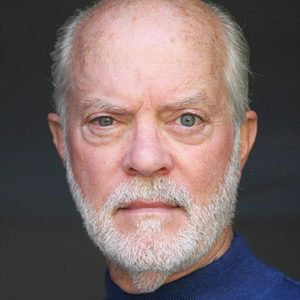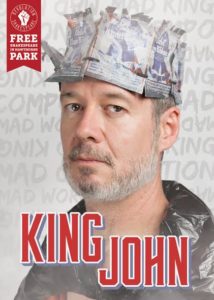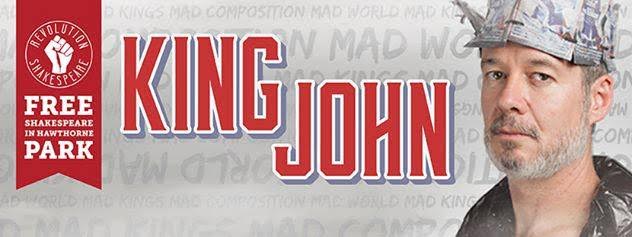Revolution Shakespeare, aka RevShakes, a Philadelphia-based company, founded by Artistic Director Griffin Stanton-Ameisen in 2013, started out with a number of fascinating programs, including an all-female reading of King Lear. They open the fall season with King John, the rarely performed play by William Shakespeare, directed by Dan Kern.

The Artistic team includes Lighting Designer Andrew Cowles; Costume Designer Natalia de la Torre; Scenic Designer Andrew Cowles; and Sound Composer Christopher Colucci.
King John: “Politics, Intrigue, Murder, War—this King John is set in a future world after the collapse of civilization. A corrupt ‘ruling class’ has seized power and is now embroiled in a vicious struggle for total dominance. Through the midst of this mayhem strides ‘Philip the Bastard,’ one of Shakespeare’s most dashing and delightful characters, who, with a deadly sword and a healthy dose of humor, saves the honor of his country.” Revolution Shakespeare brochure.
Director Dan Kern, professor of drama at Temple University, also spent a lifetime as a director and as a highly respected stage and film actor, including Me and the Big Guy (1999), Frasier (1999), Star Trek: Next Generation (1990), Star Trek: Voyager (1997), Taking Care of Business (1990), and White Mile (1994), as well as leading stage roles at ACT in San Francisco, South Coast Rep, A Noise Within, and the Mark Taper Forum in Los Angeles. He’s been awarded two LA Drama Critic’s Awards and received a Barrymore Award for his direction of Skylight at the Lantern Theatre in 2008.
Henrik: You and Revolution Shakespeare are tackling King John, a play that shows the brutalities of politics, intrigue, murder, and war. How well do you think contemporary Americans would relate to what appears to be a classical version of the theater of cruelty?

Dan: Ultimately, I think the play is one of hope. In the final lines of the Bastard, he declares that England will never fall if her citizens remain true to themselves. Together, the people have overcome the reign of a cruel ruler and the threat of France. Although there is great “cruelty in the play”—that’s not its overriding theme.
How do you see King John, the man?
If we see John’s humanity then we see a man goaded by his mother to take the throne and then spends most of his reign defensively trying to hold on to power. Not a villain—a man simply trying to keep his head above water. A weak man, yes, but in his struggle and failure perhaps we can come to appreciate the virtues of someone who has the courage to acknowledge weakness and still tries to find a way to do the right thing.
In this world of intrigue and struggles, what stands out for you?
Some of the most powerful and exciting moments I’ve spent in the theater are in plays and productions that tackle the great mythic stories of literature—sadly, most of those great moments in the theater are few and far between.
What do you think causes such limitations in the theater world?
I think in some instances it’s because our directors are perhaps caught in the trap of pandering for reviews and focus on novelty rather than the play. In other instances it may be they don’t really understand how actors work and so are given to intellectualize the process—a death knell for most actors. I’ve probably stuck my neck out far enough on this one, so I’ll let it go at that.
Why do you think that is?
I love new work and am committed to its importance to a healthy theater, but we must remain in touch with our dramatic heritage, in particular the language of the great writers.
How did you handle this highly complex play that is so difficult that many directors have carefully avoided working on King John?
I found myself struggling in rehearsal to find a way to help this talented cast bring Shakespeare to life in a way that will illuminate the text for the average audience. In the early days of rehearsal, ironically, I found myself working similarly to the way I teach. Will it work? I’ve encouraged everyone to make the imagery clear and to lift the energy and/or stakes in the scenes.
You set this King John “in a future world after the collapse of civilization.” How did that concept evolve?
Well, necessity is the mother of invention. This is a young company with modest means so anything that is too costume-heavy, such as a period version, is out of the question. A contemporary version is then saddled with the anachronisms of swords, guns, etc. Also, I think the younger generation is taken with sci-fi and fantasy and so the making of a post-apocalyptic world is an attractive option.
Tell us more about that concept and how you are making it convincing for our time?
In spite of its less than stellar construction, John is a timely piece for this fall’s election. Whether Kings and Queens or elected officials, the truth is that power is almost always placed in the hands of people with all the failings of humanity. John isn’t the evil villain of Robin Hood tales any more than his storied older brother is the courageous hero who kills a lion single handedly. Our insistence on seeing our politicians and elected officials as somehow bigger than life maybe part of the equation.
Power and control issues?
My hope is that part of the message here is to understand how seductive power is and why it tends to corrupt.
Which parts of the original play did you cut and why?
Essentially, I eliminated the Pembroke Salisbury sub-plot. The rest of the cuts were attempts to condense scenes with the objective of saving time and sustaining audience attention.
The image of King John with a crown made of beer cans suggests a less historical and a more innovative approach to this difficult and complex play.
When we were in the midst of teching the show, I’ve asked the actors to use local Northeastern [American] accents. It’s proving controversial, but that is one way in which we’re trying to take the play out of the world of Kings and Queens and with this less formal approach to language to hopefully make the language more accessible. Already there are people who don’t like it or who are offended by it. We’ll see!
Which approach to directing did you use and how cooperative were the actors and the artistic team?
I’m using a text-based approach. In other words, the language is paramount. So many choices are about illuminating the text and making the story as clear as possible. It’s been a big job as there are several large scenes with very challenging dialogue.
Shakespeare productions in parks sometimes introduce external events to make it a fun event. What did you do to entertain, inform, and challenge—without walking into some of those traveling carnival traps?
Well, spectacle is indeed a big part of a successful production of Shakespeare—whether it be fiery speeches or lots of battles. This is a history play so we have lots of that. I’m using the character of Peter of Pomfret, who appears briefly in one scene in Act 4 as conceptual arc for the play. Peter, played by Merci Lyons-Cox, is the reincarnation of the original Peter and she/he is a rock star with a band. During the course of the play she will morph from Peter into the character of Arthur, then become Blanche of Spain and finally Prince Henry at the end of the play.
What becomes of these characters eventually?
All of these characters are exploited and/or killed in the course of the play. We have songs interspersed that serve as a chorus-like function commenting on the action. My hope is that we’ve struck a balance with plot, character, language, and message that won’t fall into a carnival. We’ll see!
Given that the concert is free of charge and easily accessible in a park, how do you assess the chance that this production of King John could win over more people to see Shakespeare productions in the future?
Well “free” is certainly an attractive quality! I also think a lot of Shakespeare lovers will be anxious to see a play so rarely performed. Personally, I’ve never seen it performed live and I’ve seen a lot of Shakespeare. And certainly my hope is that we’ll be successful enough that our audiences will truly enjoy themselves.

You have worked in university theaters, commercial theaters, and film productions—places that usually operate on more than a shoestring budget and generally are supported by large crews and whatever established cultural organizations can provide. However, RevShakes is one of several new Philadelphia companies with great ideas, great actors, and great theater artists, but without the administrative backing of larger theaters. Tell us more about working in this environment?
It’s a challenge. But we’re all here for the love of the material and the art form so we operate in the realm of “Creative Austerity.” Many times good things can happen when you have to make do.
How do you see the future of theater in general and in Philadelphia in particular, given the strong pull of electronic media?
It’s a depressing thought, but the death of live theater has been hailed for decades and somehow we manage to hang on. In fact, I think there’s more live theater now across the country than there has been at any time. Broadway is the place that’s in trouble!
You pointed out that our younger generation is so immersed in technology that they’ve drifted away from reading or anything that doesn’t fit in their pockets.
Our ability to express ourselves verbally is an integral part of who we are as humans. It’s what makes us unique, and I just hate to see us lose that. The cumulative knowledge of civilization is contained in the great works of literature. We must preserve that and I long to see it preserved.
Theater goers in the non-English speaking world have the advantage that they can choose from many different translations. As a result the language of Shakespeare does not seem as alien to people in Germany, France, or Argentina, as it does to theater-goers in London or Philadelphia.
For a number of reasons it would seem that our modern audiences have a limited ability to connect with language. Or is it that the productions of the great language they’re hearing and seeing aren’t connecting? It may be presumptuous to make a comment like that, but I’ve seen much good Shakespeare, though most of it has been in England. However, there are some strong companies that are doing fine work.
Could you give an example?
APT [American Players Theatre] in Spring Green, WI. I believe the reason those companies excel is that their priorities are making the language accessible which is achieved by casting skilled actors and focusing on text—regardless of concept or setting.
How could education help in bridging some of those linguistic and cultural gaps?
Much of my teaching has been based on the belief that if an actor has the talent and training, she/he can make that connection.
How do many young actors deal with Shakespeare and how do you integrate modern acting techniques when directing Shakespeare?
Actors tend to judge themselves and others on a perception of “believability”—that perception is probably shaped more by what they see on film and TV than what they’ve seen in a theater.
How do you help younger actors to go beyond where they think they are or should be?
If they are pushed to the size that is intended for larger than life material, they immediately sense they are out of their comfort zone. There are, of course, many fine actors who do feel comfortable in that range, but I find myself spending a good deal of time pushing to raise the stakes and energy of the work —while reassuring them that it will be believable.
One of the most rewarding aspects of the work is when an actor catches a glimpse of what it can be like to rise to the level of Shakespeare’s writing and then just take off. The actors suddenly realize how much fun it can be.
What do you enjoy the most about this production?
As always for me, the most fun part is working with the cast and this production has been no exception.
What were the greatest challenges for you?
As you might suspect, integrating the music with the play has been a challenge.
Would you be willing to share something about yourself that only your best friends know?
That could raise some eyebrows! I think most people see me with my professor’s hat on when, in truth, I’m one of the least academic fellows you’re likely to meet in a university.
What surprised you the most about yourself in directing this King John?
That I lack the stamina of my youth! I come home every night—completely exhausted.
Is there anything else you would like to share?
My wife Nancy Boykin [one of Philadelphia’s most revered actors], has always been one of my great support systems. As with many folks in this line of work the challenges can be very frustrating and I tend to be very hard on myself. Fortunately, in spite of my “angst,” she’s always willing to try and make me see the bright side. For that I’m deeply grateful.
Many thanks, Dan.
Running Time: Two hours, with no intermission.
King John plays through October 1, 2016 at The 2016 Philadelphia Fringe Festival and is presented by Revolution Shakespeare, performing at Hawthorne Park – 12th and Catherine Street, in Philadelphia, PA. Admission is free.
LINK:
Review of King John by Tim Dunleavy.





